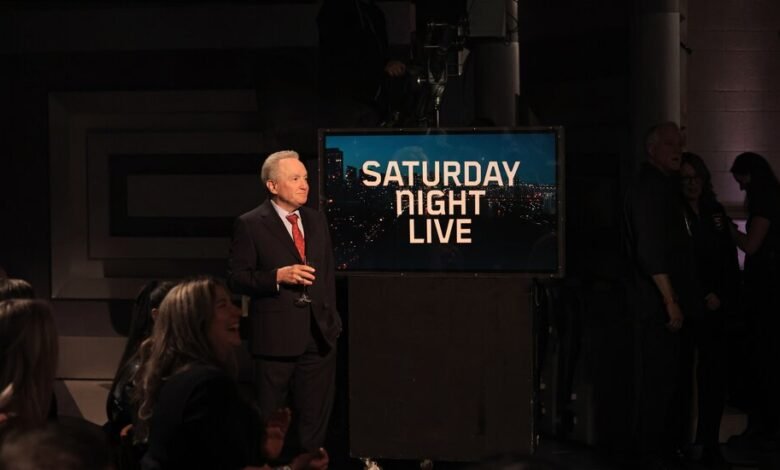The Business of Being Lorne Michaels

It’s 1:01 a.m. on a Sunday in May, and Lorne Michaels, the creator and producer of “Saturday Night Live,” has just finished the final episode of the 49th season. He spent those 90 minutes walking backstage, hands in his pockets, watching the actors, allowing himself only the occasional chuckle of satisfaction.
As the cast members take the stage to celebrate another year in the books, they enthusiastically embrace each other and embrace the evening’s host, actor Jake Gyllenhaal, and musical guest, pop phenomenon Sabrina Carpenter.
But on the dance floor, Michaels, 79, has just concluded his 20th show of the year with resignation: “I only see the mistakes,” he says. Some jokes could have gone down better, and he’s questioning his choice to shorten certain sketches. He’ll likely spend the weekend persevering over every detail, he says. On Monday, he will find some degree of contentment – until he has to do it all over again.
Michaels, through “SNL,” built an entertainment empire that has survived for half a century despite the dismantling of traditional television.
He is reluctant to call himself chief executive, but beneath his Canadian humility he has become something of a management guru: he spends his days recruiting super talent, managing egos, meeting almost impossible weekly deadlines, wading into controversies – in most cases deftly — and navigating a media landscape that has driven many of his peers out of business.
At the same time, unlike most chief executives who have become the face of their brand, he studiously avoided the spotlight.
“I spent my life close to things to stay more in the shadows,” Michaels said, describing what business professors might call a servant leadership style. “You’re supposed to make other people look good.”
Recruiting could be Michaels’ superpower. He found comedic talent across generations: Dan Aykroyd, Chevy Chase, Eddie Murphy, Will Ferrell and Tina Fey.
“Mainly, you’re looking for anything that says it’s original,” Michaels said. “It’s just an instinct that the way your mind works, something more interesting is going to happen.”
Part of his approach is to look beyond the usual suspects, the famous comedians from Los Angeles and New York, and instead try to find new talent in middle America.
It’s gotten tougher since the pandemic devastated many of the live venues that served as farm crews for “SNL” stars. The Second City, which spawned Gilda Radner, John Belushi, Chris Farley and Fey, faced additional pressure over its handling of race and was sold to private equity firm ZMC in 2021, reportedly for $50 million.
Last season, Michaels leaned more on celebrity hosts like former “SNL” mainstay Kristen Wiig to ease pressure on his less experienced cast, he said.
Michaels is no stranger to the challenges new stars face. “If you were the funniest kid in your class or in school, and then you were working professionally and everyone else in the room was like that,” he said. “It can be upsetting or really exhilarating.”
When these talents reach great heights, Michaels’ job often gets harder, not easier. Hand holding takes on a different form.
“No one can handle fame,” Michaels said. “We’re usually more tolerant of it, but you know people are going to turn into idiots. Because it’s just part of that process, because no one grew up like that.”
Some in its cast handled the spotlight more easily than others. Belushi and Farley died from drugs at age 33, after participating in the program. Pete Davidson, who will leave “SNL” in 2022, has openly discussed his anxiety and time in rehab.
It’s partly Michaels’ calmness, suggested Paul McCartney, a longtime friend, that makes the weekly comedy circus that is “SNL” possible.
“He’s a benevolent dictator,” said McCartney, who met Michaels at a party McCartney hosted at Harold Lloyd’s Greenacres estate in Beverly Hills, California. to instill in everyone the feeling that this is going to work.”
In a sea of chaos, Michaels reigns over “SNL” with practiced discipline. He never missed a Saturday night and arrived at the reading table soon after one of his three children was born. There is a weekly routine, including a 6pm meeting on Monday where Michaels introduces the host, and Tuesday night at an Italian restaurant.
“The idea that on Friday night we still don’t have a vacancy is no longer scary,” he said. “It’s not common, but it’s not uncommon.”
The show often generates controversy, but it can also run into it by accident, turning Michaels into an eventual crisis manager, as when musical guest Sinead O’Connor tore up a photo of Pope John Paul II in 1992.
“SNL” dropped comedian Shane Gillis in 2019 after racist slurs he had made on a podcast came to light. Gillis is now selling out stadiums, and the show brought him back as host this year.
“I think ideas blossom in a moment,” Michaels said of the quick reaction and seemingly equally quick forgiveness. “They used to be called manias.”
Those who hosted the show, and Michaels, say its intensity and longevity created a culture especially suited to showing it: Makeup artists transformed an actor into Butt-Head (Beavis’s partner) in three minutes; costume designers created a quick replica of all of Prince Harry’s wedding outfits; the writers grew up watching and now serve as a sounding board for Michaels, who started out as a writer.
“He’s listening — he’s having conversations with all these people about what’s funny, what’s working,” said actress Emma Stone, a five-time host. “There’s a group of brains there that he cultivates.”
Unlike most companies, when things go well at SNL, the best people leave. Wiig, Ferrell, Maya Rudolph and others have gone on to great careers in film and television.
“I met Lorne in ’91 or ’90,” said Chris Rock, whose career included several films with his “SNL” co-star Adam Sandler. “I’ve never been broke since.”
Instead of getting upset when talent leaves and the challenge that turnover creates, Michaels seems to embrace it as part of the model. He says he offers the same advice to all the big names who come sit on his couch and tell him they’re planning to leave: “Build a bridge to the next thing, and when it’s solid enough, cross over. But don’t give up right away, because you don’t know what’s really out there.”
Sometimes, even when stars cross the bridge, they remain within Michaels’ orbit. His media company, Broadway Video, produced “30 Rock,” “Mean Girls” and “Wayne’s World.” He chose Jimmy Fallon from the cast of “SNL” to host “The Tonight Show,” which Broadway Video also produces, along with the rest of NBC’s late-night programming.
Michaels’ broader mission also requires dealing with the industry’s difficult economic situation. NBCUniversal recently cut Seth Meyers’ late-night band amid broader industry budget cuts.
“I think everyone had to go through some belt-tightening,” Michaels said of the cuts. “I think the only person who really believes in the network model right now is Ted Sarandos, who seems to be building one,” she added, referring to the Netflix co-chief executive.
NBC has apparently granted unusual independence to “SNL.” (Season 46 cost about $138 million to produce, according to public records.) That’s probably because, in addition to serving as NBC’s talent factory, “SNL” helps the network stay in the cultural conversation.
The show’s 50th season will seek to celebrate its dominance in media and pop culture. Music producer Mark Ronson and Michaels will effectively produce a homecoming at Radio City Music Hall on February 14, followed by a primetime special featuring current and former stars that Sunday. Questlove, the musician and producer, is co-producing an anniversary documentary about “SNL’s” mark on music and culture, and Morgan Neville is producing five documentaries about “SNL” and Michaels.
The celebration will also inevitably raise questions about Michaels’ retirement. The show poked fun at the ages of both presidential candidates: Donald Trump, 78, and Joseph R. Biden Jr., 81. But as Michaels prepares to lead a landmark season, industry insiders wonder if he is also preparing for the its own season. SNL” farewell. And they have already begun to speculate who would take his place.
Michaels deflects the issue, shifting the spotlight from him to the show: “I’m going to do this as long as I feel like I can,” he said. “But I trust other people and always have.”
Thanks for reading! We see ourselves on Monday.
We would like to receive your feedback. Email thoughts and suggestions to dealbook@nytimes.com.




